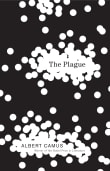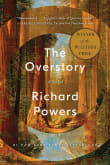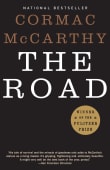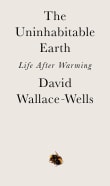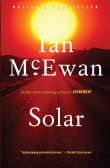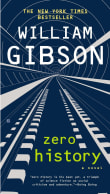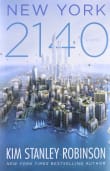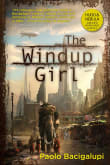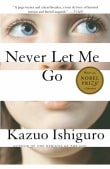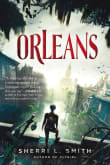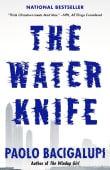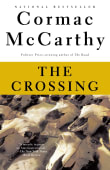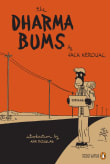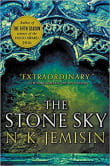Parable of the Sower
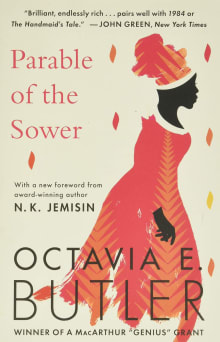
Book description
The extraordinary, prescient NEW YORK TIMES-bestselling novel.
'If there is one thing scarier than a dystopian novel about the future, it's one written in the past that has already begun to come true. This is what makes Parable of the Sower even more impressive than it was when first published'…
Why read it?
28 authors picked Parable of the Sower as one of their favorite books. Why do they recommend it?

Parable of the Sower definitely deserves to be considered alongside Margaret Atwood's The Handmaid's Tale as a book written several decades ago (1993 in this case) that's eerily prescient of today's world.
Butler's vision of a 2024 California fractured by climate change, water shortages, and extreme wealth disparity seems unpleasantly plausible, even if things aren't quite *that* bad. Yet...

I’ve long been inspired by Butler’s writing, which features BIPOC characters front and center. As a multiracial person, I seldom saw people who looked and thought like me in the older fiction I read.
The notable thing about this book is that it’s technically science fiction, not alternate history, since the novel's beginning in 2024 (this year!). However, much of what Butler wrote has come to pass, raising one question: Has her vision of the future become an alternate version of the past? I love trying to wrap my head around that conundrum.
From Alison's list on reimagine the past and see a strange new future.

I grew up reading every book I could borrow from the science fiction section of my local library. But somehow, I didn’t read anything by Octavia Butler until the mid-2010s. Why weren’t her books forced on me? I would have LOVED them.
This book is disturbing and uplifting, showing that near-future California is declining due to environmental pollution, political upheaval, and economic insecurity. The heroine is Lauren Olamina, a young woman with “hyper-empathy” who takes on other people’s emotions and pain. Lauren also serves as a beacon of hope with her growing “Earthseed” movement that attracts followers (and unwanted attention)…
From Cody's list on thought-provoking sci-fi novels set in vivid worlds.

This is the first book I ever read by Butler and it remains my favourite. Butler’s vision of near-future America is one of climate crisis, economic collapse, and social anarchy. The scenes of violence and degradation are terrifying.
What I love about this novel is how Butler creates a true hero – visionary, determined, and inspirational – in Lauren, a teenage girl. Written as a journal, the protagonist’s youth can be heard in her language ("I hate being a kid," she complains), but Butler has every faith in her as an extraordinary leader. In many ways, it’s a classic quest…
From Fiona's list on dark, dystopian futures written by women.

I love some books for their stories, characters, or writing; I love others for what they do to me. This is one of the latter. Whenever I thought I understood what this book was doing, it opened up another new idea–often one I found both interesting and challenging. I live my entire life immersed in books, both for work and for pleasure, so I’m always delighted when one takes me by surprise.
This book changed how I think about the small but lasting effects I have on the world around me and shaped the stories I tell myself about the…
From M.'s list on stories we tell at the end of the world.

The recent Octavia Butler renaissance means that the book needs no introduction. It remains a prescient, gripping, ominous, yet inspiring narrative that transports us into a future ravaged by climate change and neo-fascism.
The book is ruthlessly brutal in its account of what a collapse trajectory would look like in a future “United States” (existing in name and memory only). It anticipated a Trump-like figure coming to power well before this was remotely considered by mainstream American political scientists.
While dark, the book is also inspiring in that it shows how the breakdown of our current world could seed the…
From Michael's list on books that help us make sense of the future.

I didn’t read this amazing 1993 novel until 2016 when its seeming prescience about an America wracked by climate change, economic collapse, and social dysfunction became more evident.
This is maybe the best example of the kind of American novel I like to call dystopian realism—using the tools of speculative fiction to put a dark mirror up to real life and show truths conventional literary fiction cannot.
The story is told from the perspective of a girl, a Black teenager who has a rare gift of hyper-empathy, literally feeling the pain of others around her. It’s a brilliant device to…
From Christopher's list on a second American Civil War.

I used to be paid to ponder the end of the world as we know it: I was a health editor during the early years of the COVID pandemic; at the same time, I was editing environmental stories.
What I loved most about this book is that the worst has already occurred, and the protagonist, a teenager, chooses her own new way to navigate what’s still to come. I was engaged by the concepts of resilience as a survival skill, reinvention as a necessity, and rebirth as an act of personal and global faith.
I am not a fan of…
From Joanne's list on digging out when life just buries you.

Nobody does bleak futures laced with racial politics in the way that Octavia Butler does them. This book is not something you read and forget; it burns a special place in your brain and lives there forever.
Through first published in 1993, it holds an astonishing relevance for today’s burning realities since one of its central themes is the calamity that climate change will bring. Match that with the funky, fascinating protagonist Lauren Olamina and the new religion, EarthSeed, and you have a novel that you can get lost in and never want to emerge from. I’ve read it three…
From Peter's list on bleak urban futures that give you a sense of hope.

Shifting gears into the adult space, Parable of the Sower is a dystopian Afrofuturist novel of survival and resistance that is, at its heart, about embracing a world of change.
Originally published in the early nineties, it’s a disturbingly prescient novel that tells the story of Lauren Olamina, a teen coming of age in a world of extreme societal unrest, inequality, and environmental catastrophe, where the wealthy live in protected compounds while everyone else lives in a destitute world of addiction, starvation, and fear.
The novel follows Olamina as she leaves the protection of her walled-in enclave, discovers her abilities…
From Lauren's list on seeking hope after the end of the world.
Want books like Parable of the Sower?
Our community of 12,000+ authors has personally recommended 100 books like Parable of the Sower.
